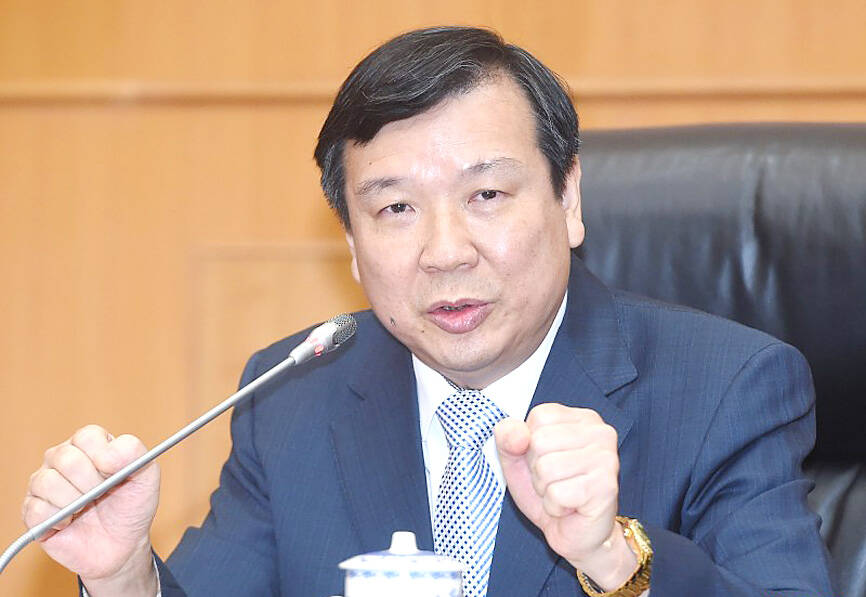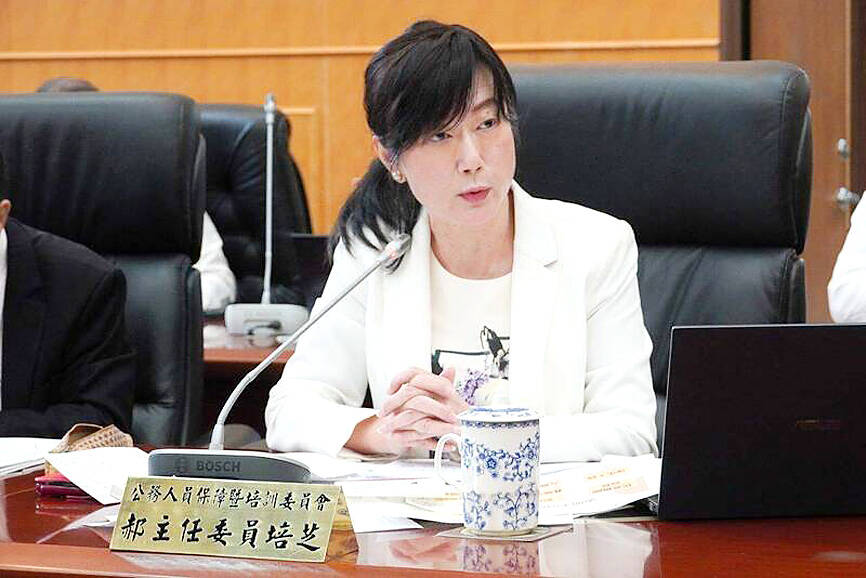Former Examination Yuan vice president Lee Yi-yang (李逸洋) is expected to replace Frank Hsieh (謝長廷) as representative to Japan when Hsieh steps down this year, sources said yesterday.
Lee, 69, has also served as head of the Civil Service Protection and Training Commission, senior adviser to the Presidential Office under former president Tsai Ing-wen (蔡英文), minister of the interior and head of the Directorate-General of Personnel Administration during the tenure of former president Chen Shui-bian (陳水扁).
Commenting on the possible appointment, Taiwan Society of Japan Studies chairman Kuo Yu-jen (郭育仁) said that President William Lai (賴清德) trusts Lee, someone Japan would also feel confident about.

Photo: Taipei Times file
“Taiwan-Japan relations have been stable over the past eight years under Hsieh, and economic exchanges between Taiwan and Japan have become more frequent,” Kuo said, citing the establishment of a Taiwan Semiconductor Manufacturing Co (台積電) factory in Japan’s Kumamoto Prefecture.
However, Lee might face challenges in the areas of business and politics, he said.
For example, Lee has no experience in industry, which could make it difficult for him to interact with and establish connections in the Japanese business community, Chen said.

Photo: Taipei Times file
In terms of politics, it is still unclear whether Japanese Prime Minister Fumio Kishida would retain his position as head of the Liberal Democratic Party (LDP) when it holds its leadership election in September, Kuo said.
“However, the relationship between the Democratic Progressive Party and the LDP has become very close, and it should not be a problem for Taiwan, even if the LDP changes leadership,” he said.
In related news, Lai yesterday recognized late Japanese prime minister Shinzo Abe for “always lending a helping hand to Taiwan when it was in need,” in a video commemorating the former leader, who was assassinated while giving a speech in Nara, Japan, on July 8, 2022.
“His memory, and Taiwan’s gratitude toward him, will live on forever. It is Taiwan’s pineapple production season, which reminds me of Abe’s smile when he was promoting Taiwanese pineapples,” Lai said.
Abe had advocated for a free and open Indo-Pacific region, and peace and stability across the Taiwan Strait, Lai said, adding that those ideas had a profound effect on international attention toward Taiwan and the region.
Separately, Hao Pei-chih (郝培芝), head of the Civil Service Protection and Training Commission, is expected to replace Francois Wu (吳志中) as representative to France, a source said yesterday.
Hao, who received her master’s degree and doctorate in political science at Paris 1 Pantheon-Sorbonne University, previously served as a member of the advisory committee at the Mainland Affairs Council from 2007 to 2009.
During Wu’s tenure, the French National Assembly voted overwhelmingly in support of Taiwan’s participation in international organizations. Wu has also been highly praised by legislators from both the ruling and opposition parties in Taiwan.
Hao would likely face great challenges with the increasing influence of far-right parties in French politics, the source said.
The Ministry of Foreign Affairs yesterday said it could not yet confirm who Hsieh’s or Wu’s replacements would be.

AGING: As of last month, people aged 65 or older accounted for 20.06 percent of the total population and the number of couples who got married fell by 18,685 from 2024 Taiwan has surpassed South Korea as the country least willing to have children, with an annual crude birthrate of 4.62 per 1,000 people, Ministry of the Interior data showed yesterday. The nation was previously ranked the second-lowest country in terms of total fertility rate, or the average number of children a woman has in her lifetime. However, South Korea’s fertility rate began to recover from 2023, with total fertility rate rising from 0.72 and estimated to reach 0.82 to 0.85 by last year, and the crude birthrate projected at 6.7 per 1,000 people. Japan’s crude birthrate was projected to fall below six,

Conflict with Taiwan could leave China with “massive economic disruption, catastrophic military losses, significant social unrest, and devastating sanctions,” a US think tank said in a report released on Monday. The German Marshall Fund released a report titled If China Attacks Taiwan: The Consequences for China of “Minor Conflict” and “Major War” Scenarios. The report details the “massive” economic, military, social and international costs to China in the event of a minor conflict or major war with Taiwan, estimating that the Chinese People’s Liberation Army (PLA) could sustain losses of more than half of its active-duty ground forces, including 100,000 troops. Understanding Chinese

US President Donald Trump in an interview with the New York Times published on Thursday said that “it’s up to” Chinese President Xi Jinping (習近平) what China does on Taiwan, but that he would be “very unhappy” with a change in the “status quo.” “He [Xi] considers it to be a part of China, and that’s up to him what he’s going to be doing, but I’ve expressed to him that I would be very unhappy if he did that, and I don’t think he’ll do that. I hope he doesn’t do that,” Trump said. Trump made the comments in the context

SELF-DEFENSE: Tokyo has accelerated its spending goal and its defense minister said the nation needs to discuss whether it should develop nuclear-powered submarines China is ramping up objections to what it sees as Japan’s desire to acquire nuclear weapons, despite Tokyo’s longstanding renunciation of such arms, deepening another fissure in the two neighbors’ increasingly tense ties. In what appears to be a concerted effort, China’s foreign and defense ministries issued statements on Thursday condemning alleged remilitarism efforts by Tokyo. The remarks came as two of the country’s top think tanks jointly issued a 29-page report framing actions by “right-wing forces” in Japan as posing a “serious threat” to world peace. While that report did not define “right-wing forces,” the Chinese Ministry of Foreign Affairs was